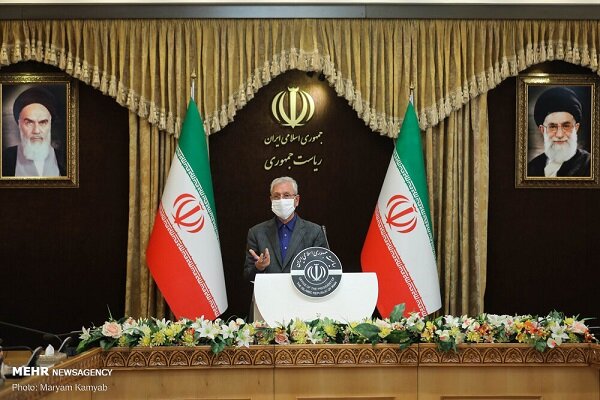Iran calls on ‘new White House officials’ to unconditionally return to commitments

TEHRAN – Ali Rabiei, the Iranian government spokesman, said on Thursday that Iran expects the incoming White House leader to unconditionally return to Washington’s obligations, according to the Islamic Republic of Iran Broadcasting (IRIB) news agency.
“We expect the new White House officials to unconditionally return to all their previous obligations and commitments,” Rabiei said in an interview with the IRIB news agency. “In the first step, sanctions and barriers to the transfer of Iranian money must be lifted and the U.S. administration must be held accountable for the damage it has done to the Iranian people during this period.”
The spokesman said Iran is dealing with White House policies, not politicians.
He added, “Basically, when we were negotiating with the Obama administration, we were not actually negotiating with the Democratic Party, we were negotiating with the U.S. government, but it was Trump who pushed back his rival party policies and replaced them with hostile policies. Therefore, we will follow the policies, behaviors, and actions of the other party and adopt the necessary policies accordingly.”
Rabiei also pointed to the U.S. presidential election, noting that the American people said no to “racism and bullying”.
“In the U.S. election, the American people have said no to the racist, bullying, and interventionist policies of their statesmen around the world. We believe that the next administration of the United States of America must respect and abide by this popular vote,” said Rabiei, adding that the Donald Trump administration has created a lot of troubles around the world and at home.
“The future administration of this country [U.S.] should be the representative of the American people in saying no to the Trump policies,” the spokesman said.
In an apparent reference to a 2015 nuclear deal between Iran and world powers that Trump abandoned more than two years ago, Rabiei also called on the new U.S. administration to return to agreements that the Trump administration left.
Trump pulled the U.S. out of the Iran nuclear deal, officially known as the Joint Comprehensive Plan of Action (JCPOA), on May 8, 2018, reimposing sweeping economic sanctions on Iran in a bid to force the country into signing what Trump called “better deal.” Iran has refused to renegotiate with the U.S. over past few years, saying it will not hold talks with the White House under the sanctions pressure.
“The future administration of this country must pay attention to all the treaties that the previous U.S. administration has violated and abandoned, and return to these treaties,” noted Rabiei, adding, “Our clear expectation from the new White House officials is an unconditional return to all previous obligations and commitments.”
The spokesman said Iran would closely watch the statements and actions of the White House's new officials and will make a judgment at a later time.
“We will continue our national policy regardless of U.S. elections,” Rabiei asserted.
According to Rabiei, Iran has devised at least two plans for the coming months.
The first plan is a 70-day strategy that will last until January 20 and the second plan will start by January, noted Rabiei, adding that these plans were devised in accordance with internal issues and foreign policy.
Trump’s presidency will come to an end on January 20, 2021.
Iranian President Hassan Rouhani has recently called on the new U.S. leadership to change tack and reconsider Trump’s policies toward Iran, saying that “now, an opportunity has opened up for the next U.S. administration to make up for the past mistakes and return to abiding by international commitments through respecting international regulations.”
Last Week, Rouhani also said that his government will take advantage of every opportunity to lift the U.S. sanctions on Iran.
“Whenever we see that there’s a situation for the lifting of sanctions, we will make use of that,” Rouhani said at a cabinet meeting on Wednesday. “Our goal is that cruel sanctions would be lifted.”
One day later, the president said the world has realized that the “maximum pressure” policy does not work, underlining that the U.S.-adopted policy is coming to an end.
“All the signs in today’s world show the world has realized that ‘maximum pressure’ does not work and maximum pressure is coming to an end,” Rouhani said on Thursday.
SM/PA
Leave a Comment